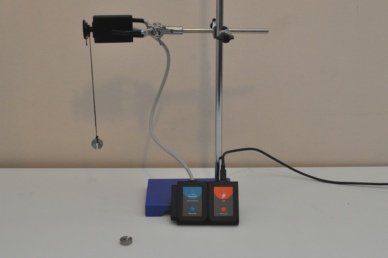Posted on August 1, 2013
| A simple pendulum is a hypothetical apparatus consisting of a point mass hanged on a thread. The thread’s mass is negligible and it is free to vibrate without friction. The motion of the hanged mass is harmonic, it swings back and forth at a constant amplitude. This is true as long as the angle from the original position is small. The amplitude of a real life pendulum swing declines over time because it is subjected to friction. A pendulum’s period is the time it takes to the hanged mass to swing back and forth. The period of a simple pendulum depends on the length of the thread and the gravitational acceleration (g); not on the mass of the pendulum. A pendulum with a long thread has a greater period than one with a shorter thread. The period and the frequency (1/period) are independent of the initial angular position (for small swings). In this experiment, we will measure the angular position over time of a swinging hanged mass connected to a rotary motion sensor through a thread. Different lengths and different masses will be examined, and the expected period will be compared with the measured period. Download experiment |
|
 |
|